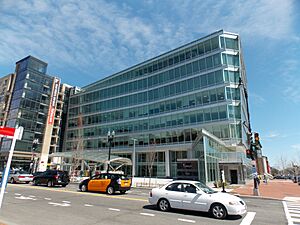UNCF facts for kids
 |
|
| Abbreviation | UNCF |
|---|---|
| Founded | April 25, 1944 |
| Founder | Frederick D. Patterson Mary McLeod Bethune |
| Type | Educational |
| Legal status | 501(c)(3) |
| Purpose | To build a pathway of educational support from K–12 through college and career. |
| Headquarters | 1805 7th Street NW Washington, D.C. 20001 |
|
Area served
|
United States |
| Dr. Michael L. Lomax | |
|
Revenue (2018)
|
$89,277,523 |
| Expenses (2018) | $171,722,769 |
| Endowment | $103,734,086 (2018) |
|
Employees (2017)
|
281 |
|
Volunteers (2017)
|
2,584 |
UNCF, which stands for the United Negro College Fund, is an American organization that helps students go to college. It gives out scholarships to many students, especially Black students. UNCF also provides money to 37 private historically black colleges and universities (HBCUs). These are colleges that were first created to educate Black students.
UNCF was started on April 25, 1944. Important founders included Frederick D. Patterson, who was the president of Tuskegee University, and Mary McLeod Bethune. The main office for UNCF is in Washington, D.C. In 2005, UNCF helped about 65,000 students. Many of these students were the first in their families to attend college.
The current president and CEO of UNCF is Michael Lomax.
Contents
Helping Students Go to College
UNCF was created to help Black students get a good education. Today, its scholarships are open to students of all backgrounds. However, most students who receive help are still African American. UNCF provides scholarships for students attending its member colleges. It also helps students who go to other universities.
Many successful Black leaders have graduated from UNCF-supported schools. Some famous people include:
- Dr. Martin Luther King Jr., a Nobel Peace Prize winner and leader in the Civil Rights Movement.
- Alexis Herman, who used to be the U.S. Secretary of Labor.
- Movie director Spike Lee.
- Actor Samuel L. Jackson.
- General Chappie James, the first Black four-star general in the U.S. Air Force.
- Dr. David Satcher, a former U.S. Surgeon General.
How UNCF Started
In 1944, William J. Trent worked with Frederick D. Patterson and Mary McLeod Bethune to create UNCF. It was a non-profit group that brought college presidents together. Their goal was to raise money as a team. They wanted to ask the whole country for support.
William J. Trent was the first leader of UNCF from 1944 to 1964. During his time, he raised $78 million for historically Black colleges. He wanted these colleges to be strong places of learning. They would help students achieve the American dream. In 2008, UNCF started using only its initials. This was because attitudes toward the word "Negro" had changed. They also created a new logo.
Raising Money for Education
UNCF gets donations from many people and groups. These donations help fund its scholarship programs. One famous donation came from John F. Kennedy. He was a senator at the time and later became U.S. President. He gave the money he won from the Pulitzer Prize for his book Profiles in Courage to UNCF. In 1990, Walter Annenberg also gave a large donation of $50 million.
Starting in 1980, singer Lou Rawls hosted a TV show called the "Lou Rawls Parade of Stars." This show was a telethon to raise money for UNCF. A telethon is a long TV program that asks viewers to donate. This event is now called "An Evening of Stars." It shares stories of successful Black students. These students have graduated from or been helped by HBCUs and UNCF. The telethon also features comedy and music performances. By 2006, the event had raised over $200 million.
In January 2004, Lou Rawls was honored by UNCF. This was for his more than 25 years of charity work. Many famous artists performed to celebrate him. These included Stevie Wonder and Ashanti. Lou Rawls passed away in January 2006. His last performance was for the 2006 telethon.
Besides the telethon, UNCF has other fundraising events. There is a "Walk for Education" in Los Angeles, California. In Houston, Texas, there is an annual golf tournament. In 2014, Koch Industries Inc. and the Charles Koch Foundation gave $25 million to UNCF. In 2020, Netflix founder Reed Hastings donated $120 million. This was the largest donation in UNCF history. It was given for student scholarships.
The UNCF Motto
In 1972, UNCF chose its famous saying: "A mind is a terrible thing to waste." This motto has become one of the most well-known slogans in advertising. It means that everyone's mind is valuable. It should be used for learning and growing. The motto was created by Forest Long of the advertising agency Young & Rubicam. They worked with the Ad Council.
UNCF also uses another slogan. It says that students are "not asking for a handout, just a hand." This means they are not asking for free things. They just need a little help to reach their goals.
Colleges UNCF Supports
UNCF supports many colleges across the United States. These are mostly private historically Black colleges and universities. Here is a list of some of the member institutions:
Alabama
- Miles College, Birmingham
- Oakwood University, Huntsville
- Stillman College, Tuscaloosa
- Talladega College, Talladega
- Tuskegee University, Tuskegee
Arkansas
Florida
- Bethune-Cookman University, Daytona Beach
- Edward Waters College, Jacksonville
- Florida Memorial University, Miami Gardens
Georgia
- Clark Atlanta University, Atlanta
- Interdenominational Theological Center, Atlanta
- Morehouse College, Atlanta
- Paine College, Augusta
- Spelman College, Atlanta
Louisiana
- Dillard University, New Orleans
- Xavier University of Louisiana, New Orleans
Mississippi
- Rust College, Holly Springs
- Tougaloo College, Tougaloo
North Carolina
- Bennett College, Greensboro
- Johnson C. Smith University, Charlotte
- Livingstone College, Salisbury
- Saint Augustine's University, Raleigh
- Shaw University, Raleigh
Ohio
South Carolina
- Allen University, Columbia
- Benedict College, Columbia
- Claflin University, Orangeburg
- Morris College, Sumter
- Voorhees College, Denmark
Tennessee
- Fisk University, Nashville
- Lane College, Jackson
- LeMoyne-Owen College, Memphis
Texas
- Huston–Tillotson University, Austin
- Jarvis Christian College, Hawkins
- Texas College, Tyler
- Wiley College, Marshall
Virginia
 | Shirley Ann Jackson |
 | Garett Morgan |
 | J. Ernest Wilkins Jr. |
 | Elijah McCoy |


